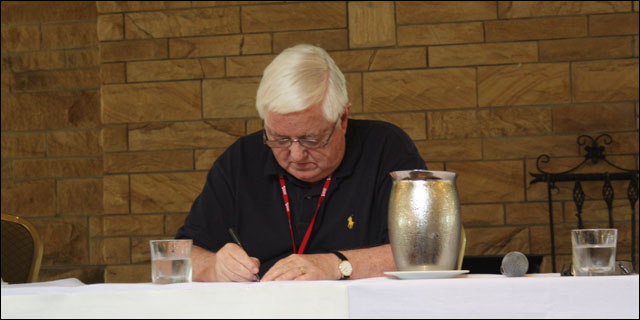Exetel, is your NBN pricing for real?

commentary When Exetel chief John Linton this week revealed the ISP's projected National Broadband Network pricing for Tasmania, my first thought was: "Is this for real?" After all, the company is expecting to offer 25Mbps fibre connections for zero dollars a month, with downloads being charged at $1 per gigabyte.

John Linton (Credit: Delimiter)
That's the sort of pricing that most people would think was complete insanity. If there was no minimum download limit, you might get quite a few people signing up for 5GB monthly plans, and only paying $5 for the privilege. You could fund that amount per month by skipping one McDonald's happy meal.
As Penny Arcade might say, expecting such broadband plans to actually make a profit is more insane than expecting a magical cloud of fairies — each with a tiny picnic basket — to fly gold coins from the great Telstra treasure cave on Mount Doom to John Linton's personal bank account. When you live in a world of fantasy, after all, anything is possible.
However, as we've previously noted, John Linton is not (that) crazy. And in fact, if you examine the logic behind Exetel's NBN pricing plans, you'll find they actually make a strange kind of sense.
As Linton pointed out this week, the implementation of the NBN will reset Australia's telecommunications industry. Over more than a decade, Telstra's wholesale broadband pricing structures and backhaul costs have shaped the industry's pricing plans until they are what they are today: complicated and unwieldy.
The onset of the NBN gives ISPs a chance to re-examine that structure outside of the bounds of commercial agreements with Telstra. The only factors they need to consider are what pricing models will allow them to make an acceptable return on their money relative to NBN Co's wholesale rates, and what their competitors are doing.
In other words, NBN Co is about to fire the starting pistol on the biggest land grab for broadband customers that Australia has ever seen.
John Linton knows this. And so far it appears he is the only one in Australia's ISP industry.
When it came out with its own NBN pricing plans for Tasmania, national broadband player iiNet — which is an order of magnitude bigger than Exetel — appeared to have barely given any thought at all to the onset of change. Instead, it simply took its existing fibre plans from estates in Victoria and slapped an "NBN" label on them.
Linton knows this — it's why he came out this week with his own, radically different, plans. His intention is to attract customer attention to his own business and steal a large swathe of customers in Tasmania. And, of course, it's good publicity for a smaller player like Exetel to stick it to the man in the person of the larger ISPs like iiNet and Primus that have grown fatter and lazier over the years (although nowhere near as fat and lazy as Telstra and Optus).
Linton is also prepared to say in public what so few other heads of ISPs are — that he is tired of subsidising leechers — those who use their broadband to download dozens of gigabytes of movies, TV shows and video games each month.
As the Exetel chief said this week, it's the light downloaders — those who only consume a few gigabytes of data each month — that are subsidising the torrenters. And it doesn't seem like he cares if light downloaders are all he attracts to the Exetel NBN services in Tasmania. Why should he? These are the customers who are making profits for his company, after all.
When you stack up Exetel's NBN plans for heavy downloaders against iiNet's, they start to look pretty woeful — and iiNet's own high-speed plans were already pretty poor, in my opinion, with users to be charged $129.95 per month if they want the full 100Mbps speeds promised by the NBN's fibre.
The wild card in all of this is Internode. I don't expect iiNet or Primus to come out with remarkable NBN plans in Tasmania, but the Simon Hackett mothership has been notoriously favourable to heavy downloaders and early technology adopters in the past while still maintaining solid plans for the mainstream.
Internode so far appears to be following iiNet's lead, but I'd like to see Hackett and crew come out with some really competitive NBN plans in Tasmania over the next couple of months — plans geared to offering 100Mbps speeds with a high download quota. The company should be able to bolt on other services such as its NodePhone internet telephony offering to make a modest profit and just break even on the broadband pricing itself.
If Internode followed this strategy, we could end up with a Tasmanian NBN market dominated by it at the high end and Exetel at the low end. With iiNet's existing presence in mainstream Tasmania through its Netspace acquisition, this would create a nicely structured market with enough service differentiation. Let the games begin.